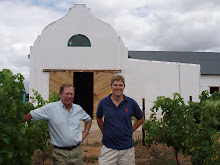Spring has arrived in the Robertson valley, and normally the dams should be full. We have experienced an extremely dry winter, which is our normal rainfall period. Some farms in the area rely on water from the surrounding mountains to irrigate their crops. Most of these farmers’ dams are completely dry, and there is little hope for decent rain before April next year. They will probably have to go into preservation mode, where crops are kept alive, as opposed to being allowed to bear a crop. This will be a huge financial loss to them, as employees still need to be paid.
Fortunately our catchment area is about 60km north of us, and there they received adequate rain to fill our reservoir. As summer progresses water will be let down the Breede River, and this will then feed into our irrigation dams.
Because we receive very little rain even a normal rainfall year, we have to irrigate in order to grow vines in Robertson. I believe this is a great advantage as we can feed the vines exactly what they need. If we have too much growth we can just turn off the taps. Farming in a dry area also reduces the need to spray fungicides, as we have very little disease pressure. This means lower costs, and more environmentally friendly grapes.
So farming without rain has its advantages if you can import the water from elsewhere!
Friday, October 1, 2010
Subscribe to:
Comments (Atom)

